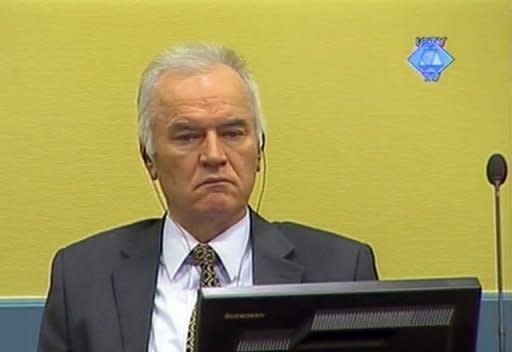Mladic war crimes trial halted over 'irregularities'
The war crimes trial of former Bosnian Serb army chief Ratko Mladic was abruptly halted on Thursday, just a day after it opened, because of prosecution "irregularities" in the high-profile case. The decision was announced by the presiding judge shortly after the prosecution described the "horror" of the 1995 Srebrenica massacre it says was orchestrated by Mladic, the worst atrocity in Europe since World War II. "The hearing is adjourned sine die (indefinitely)," said judge Alphons Orie, three hours into the trial's second day at the International Criminal Tribunal for the former Yugoslavia in The Hague. He said there were "irregularities" in the transfer of prosecution documents to the defence to enable it to prepare for the trial, but that the court hoped to announce a date soon for the resumption of proceedings. Mladic, the so-called "Butcher of Bosnia", is charged on 11 counts of war crimes, crimes against humanity and genocide over the 1992-1995 Bosnian war, and in particular the Srebrenica massacre of almost 8,000 Muslim men and boys. Before the adjournment, prosecutors showed a series of videos taken in Srebrenica after the mass killings on July 11, 1995 in what was meant to be a UN-protected enclave. The footage showed the former general triumphantly entering Srebrenica and congratulating his men. In one video, the bodies of Srebrenica Muslims are stacked in piles along a road. In another, Mladic declares: "We give this town to the Serbs as a gift." "Mladic himself was on the ground and personally involved," prosecuting counsel Peter McCloskey told the court. Mladic, now 70, often shook his head during proceedings, though at times a faint smile crossed his lips as prosecutors played video of him giving orders to troops or speaking with journalists. He appeared in better shape than at his first appearance last June, when he told the court he was a "sick man". But his defence team says he has suffered three strokes -- in 1996, 2008 and 2011 -- that partly paralysed him on his right side. "We're afraid he won't live long enough to be convicted," Hatidza Mehmedovic, a member of the Mothers of Srebrenica organisation that represents widows and victims of the massacre, told AFP Thursday. Former Serbian President Slobodan Milosevic died in custody in 2006 before the conclusion of his own war crimes trial. Mladic's defence lawyers had asked Monday for a six-month delay in the trial, saying they needed more time to prepare. Before the adjournment Thursday, McCloskey also showed the court photographs of mass graves in Srebrenica, saying: "This is an example of the horror created by Mladic." Showing a photo of a man's partially decomposed body, the mouth wide open and face gruesomely tensed, McCloskey said: "This man did not die peacefully." He said most military orders were given orally, but that certain "crucial" documents had survived and that former Mladic subordinates were willing to testify against him. Prosecutor Dermot Groome told the court on the opening day of the trial on Wednesday that Mladic had "assumed the mantle of the criminal goal of ethnically cleansing Bosnia". Groome said Thursday that Mladic's only superior was ex-Bosnian Serb political leader Radovan Karadzic, who has been on trial at The Hague since 2009. Prosecutors also hold Mladic responsible for the 44-month siege of Sarajevo, where his forces waged a "terror campaign" of sniping and shelling that left an estimated 10,000 people dead, the vast majority of them civilians. It was in pursuit of a "Greater Serbia" that Mladic allegedly also ordered his troops to "cleanse" Bosnian towns, driving out Croats, Muslims and other non-Serbs. Mladic pleaded not guilty to the charges at an earlier court hearing last June. He faces life imprisonment if convicted. After the war, which killed 100,000 people and forced 2.2 million from their homes, Mladic continued his military career but went into hiding in 2000 after the fall of his ally Milosevic. Indicted for war crimes, he was on the run until May 2011, when he was arrested at a relative's house in Lazarevo, northeastern Serbia and flown to a prison in The Hague several days later.



